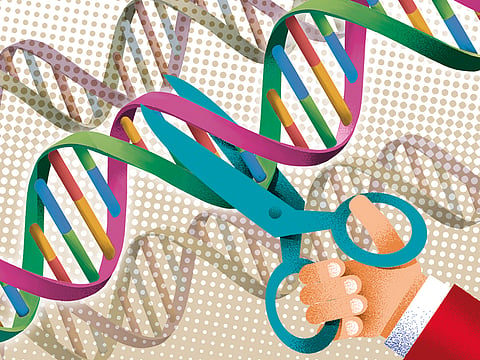World not ready for edited babies
Attempt to alter the genome of embryo in-vitro and then implant it in a womb is unethical

Sooner or later it was bound to happen. A rogue scientist in China claims to have edited a gene in two human embryos and implanted them in the mother’s womb, resulting in the birth of genetically altered twin girls. We’re no longer in the realm of science fiction. This hacking of their biological operating instructions, which they will pass on to their children and generations to come, is a dangerous breach of medical ethics and responsible research and must be condemned.
This is not to say that medicine won’t someday employ gene-editing technologies in similar ways. But that time has not arrived. There are still too many risks, too many unknowns, about tinkering with our heritable genetic blueprints.
In recent years genome editing has been appropriately heralded as the most important advance of biotechnology of our generation, and most likely the past century. Commonly known as Crispr, this technique and related DNA editing tools enable their users to cut and paste discrete letters of the genome. This capability has markedly advanced science, shedding new light on the complex human genome that are the architecture of who we are.
Already, many clinical trials using this technology are underway involving patients with rare diseases such as haemophilia, thalassemia and sickle cell. The difference between these efforts and what reportedly happened in China is that these genome editing trials involve cells from the patient’s body. The manipulations are not transmissible to the next generation. These trials are in their early stages, and we don’t yet have results to show whether this type of editing is safe or provides effective treatment. But whatever happens, the consequences are confined to the patient, who has consented to the experimental treatment. Previous genome editing studies have shown it is possible to disable a gene in adults without working at the embryo level. So the experiment was not necessary, had no scientific basis and must be considered unethical when balanced against the known and unknown risks.
Susceptible to unintended editing
The predominant risks are the potential impacts of the editing on other letters of the genome, which could induce diseases later in life even if they aren’t present at birth. Although the technology is promising, we don’t have the assurance that Crispr provides laserlike precision in editing. We know, for example, that certain important genes for suppressing cancer are particularly susceptible to unintended editing. The way we assess this risk is to sequence the genome before and after editing, to see whether changes were made in genes other than the target gene. But our ability to discern these changes is still rudimentary, and it is entirely likely that we will miss something. The fact that we may not have seen unintended mutations brought about by editing is by no means proof of their absence. With six billion letters in the genome that could be affected, the risk of unintended, “off target” editing is considerable and requires extensive scrutiny to understand and mitigate. That’s partly why editing the genes of human embryos is prohibited in the United States and banned in many European countries.
Even beyond the actual editing, this episode appears to have been marked by breaches of scientific conduct. One issue is informed consent. It is unclear whether the parents were told that there were simple ways to protect the embryos from AIDS that might have been transmitted by the HIV-infected father. Given that, why would they consent to this risk procedure?
Moreover, no report by the researchers has been produced for the biomedical community to review. It is difficult to envision a foolproof way to rein in such rogue efforts, notwithstanding the international consensus that we are still nowhere near ready for genome-edited babies. Certainly scientists like him should be castigated by their institutions and the biomedical community, as he was in this case, and perhaps that will discourage this sort of unethical research. Governments should also condemn these practices and impose significant penalties, like pulling research funding and making these scientists ineligible for more.
At this point, we don’t know whether the intended human genome editing was achieved in the twins and have no idea whether it will prove to be safe if it was accomplished. But we can conclude that this was a misguided, reckless demonstration of using powerful gene-altering tools to create edited human beings. We should not proceed down this road until we know far more about the consequences of what we are doing.
Prof Eric Jeffrey Topol is a noted American cardiologist, geneticist and digital medicine researcher. He teaches Genomics at The Scripps Research Institute, California.


